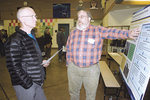The Navy offered an armada of experts to provide information to, and solicit input from, the public May 3 at Blue Heron School, but those who showed up still walked away with concerns about …
This item is available in full to subscribers.
We have recently launched a new and improved website. To continue reading, you will need to either log into your subscriber account, or purchase a new subscription.
If you had an active account on our previous website, then you have an account here. Simply reset your password to regain access to your account.
If you did not have an account on our previous website, but are a current print subscriber, click here to set up your website account.
Otherwise, click here to view your options for subscribing.
* Having trouble? Call our circulation department at 360-385-2900, or email our support.
Please log in to continue |
|


The Navy offered an armada of experts to provide information to, and solicit input from, the public May 3 at Blue Heron School, but those who showed up still walked away with concerns about environmental and cultural impacts of proposed special operations training on the Olympic Peninsula.
Civilian attendees were greeted at the school commons by uniformed members of the Hawaii-based SEAL unit, which could be practicing covert operations in the inland waters of Puget Sound, including Hood Canal, with permission from property owners. Although the Navy personnel wore their rank insignia and name tags indicating their first names, they declined to give last names and asked that photographs not be included, “to preserve operational security,” as they called it.
INVESTED IN SPECIAL OPS
The commanding officer of the unit, Capt. Mark, had also been available to the public at a similar open house the prior night, May 2, at North Kitsap High School, and described the meetings as an early stage in the Navy’s outreach to the communities that could be affected.
“The public has a lot invested in Navy special operations and ensuring that we’re the best at what we do,” Mark said. “We have to continually challenge ourselves, and the Pacific Northwest is an extremely challenging maritime environment for our operations. Between its water temperature, its turbulent currents and deep-water conditions, its complicated shoreline and its weather, it’s really a graduate-level learning environment. If you can train here, there’s nowhere else you can’t succeed.”
He acknowledged that the Navy already has a number of training grounds along the Washington coastline, but he noted the value of providing various options for trainees, to prevent them from becoming overly familiar with any one site.
At the same time, the commanding officer asserted that the core of the Navy’s training mission in the area – to teach personnel skills needed to avoid detection, and not to leave any trace of their presence, either during or after their activities – would complement the goal of not impacting the public’s use or enjoyment of those same lands.
ENVIRONMENTAL ANALYSTS
Karen Waller and Meagan Ostrem are environmental analysts working with the Navy. Waller explained that, in part because the prospective training sites have yet to be narrowed down, their analyses would adopt a broader, more holistic perspective.
“Instead of looking at specific sites, we’ll be seeking to determine how this training might affect the region as a baseline,” Waller said. “From there, we’ll be asking what types of activities would serve as stressors to the local species, such as salmon or oysters. If SEALs come on shore and walk along a beach, what will that activity do to the sand or the vegetation?”
In addition to determining how such training activities anywhere within the sound could affect the rest of the region’s resources, Ostrem emphasized that any area that serves as the site for training operations would only do so with the express permission of the site’s owners.
PUBLIC COMMENT, HISTORY
Among the members of the public who engaged Ostrem in conversation that evening was Rikki Ducornet, who lives near Fort Worden.
“Meagan has been absolutely delightful to chat with, but I’m still a bit distressed,” Ducornet said. “From April to August, we have dozens of birds that nest on the grounds of Fort Worden, and they’re already imperiled. A number of species are vanishing due to disruptions of their habitats.”
Georganne Rundblad, who also resides near Fort Worden, expressed similar concerns about how Navy trainees climbing the cliffs might accelerate their erosion, as well as degrade fish spawning sites.
“The vegetation on those cliffs is fragile,” Rundblad said. “Without it, there are fewer insects for fish to feed on, and less shade cover to keep the waters cool enough for the fish. I’m also worried about whether the chemicals in the Navy’s paintballs would go into the stormwater runoff and contaminate the water.”
“We want to hear people’s ideas and opinions on this,” Waller said. “This public feedback is an essential part of our process.”
Port Townsend resident Curtis White provided another public perspective when he spoke with Russell Sackett, a historic architect with the Navy’s team. Sackett explained that the Navy is actively involving historic experts ranging from state historic preservation officers to surrounding Native American tribes.
“We’re asking as many people as we can to identify any potential areas of historic significance,” Sackett said. “The state already has a robust database of archaeological records, but we’re consulting with all the concerned parties.”
From there, Sackett elaborated that the Navy would determine how their activities might affect the historic sites.
“If Navy SEALs are just swimming underneath the Agate Pass Bridge, that probably won’t affect it,” Sackett said, pointing to hypothetical examples of historically significant sites. “Now, with the North Head Lighthouse at Fort Casey, if they were to do things like kick down doors, that would obviously have an adverse impact, so we wouldn’t do it.”
MUDDYING THE LINES
White’s expressed concerns were cultural rather than environmental, since he sees a worrying trend of the muddying of the line between civilian and military spaces.
“If the state were to specifically designate a site for military operations, that would be fine with me,” White said. “But they’re proposing to use state parklands, that are there for our recreation and enjoyment. Even if civilians and the military aren’t there at the same time, this would help normalize the militarization of civilian spaces.”
Meanwhile, a Navy SEAL master chief petty officer was receiving a markedly different reaction from Howard Briggs, a former Army Reserve and National Guard member.
“I very much appreciate what our Navy does, especially its special operations folks,” Briggs said. “I wouldn’t think anyone would be foolish enough to say they shouldn’t do this. If so, they should visit Afghanistan, to see what kind of a difference it makes.”